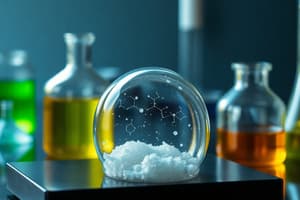Podcast
Questions and Answers
What is the aim of quantitative elemental analysis?
What is the aim of quantitative elemental analysis?
- Estimation of carbon and hydrogen in the organic compound
- Determination of the formula of the organic compound
- Detection of the elements found in a pure compound
- Detection of the percentage of each element in the compound (correct)
What is used to absorb water formed during the combustion of organic compounds?
What is used to absorb water formed during the combustion of organic compounds?
- Anhydrous calcium chloride (correct)
- CuO
- CuSO4
- Potash bulb containing KOH solution
What is the principle behind the estimation of carbon and hydrogen using Modified L Method?
What is the principle behind the estimation of carbon and hydrogen using Modified L Method?
- Organic compounds are reduced when their decomposition products come in contact with red-hot cupric oxide
- Organic compounds are completely oxidized when their decomposition products come in contact with red-hot cupric oxide (correct)
- Organic compounds are unaffected when their decomposition products come in contact with red-hot cupric oxide
- Organic compounds are partially oxidized when their decomposition products come in contact with red-hot cupric oxide
What does the increase in weight in the potash bulb correspond to?
What does the increase in weight in the potash bulb correspond to?
What is the purpose of using red-hot CuO in the estimation of carbon and hydrogen?
What is the purpose of using red-hot CuO in the estimation of carbon and hydrogen?
Study Notes
Quantitative Elemental Analysis
- The aim of quantitative elemental analysis is to determine the proportion of elements present in a compound.
Combustion of Organic Compounds
- Calcium chloride is used to absorb water formed during the combustion of organic compounds.
Estimation of Carbon and Hydrogen
Modified L Method
- The principle behind the estimation of carbon and hydrogen using the Modified L Method is that carbon is oxidized to CO2 and hydrogen is oxidized to H2O.
- The CO2 and H2O produced are absorbed by suitable absorbents, and the increase in weight of the absorbents corresponds to the amount of carbon and hydrogen present in the compound.
Potash Bulb
- The increase in weight of the potash bulb corresponds to the amount of CO2 absorbed.
Estimation of Carbon and Hydrogen using CuO
- Red-hot CuO is used in the estimation of carbon and hydrogen to oxidize the organic compound to CO2 and H2O.
- The CuO acts as a catalyst to facilitate the complete combustion of the organic compound.
Studying That Suits You
Use AI to generate personalized quizzes and flashcards to suit your learning preferences.
Description
Test your knowledge on the determination of molecular formula of organic compounds through qualitative and quantitative elemental analysis. Explore methods for estimating the percentage of carbon, hydrogen, and nitrogen in compounds.




